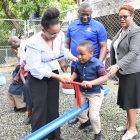ADMINISTRATORS at three schools in the parishes of St Thomas, Portland, and St Mary, which were identified as being in need of immediate assistance, are crediting the iLead education leadership programme for a drastic turnaround in performance levels and staff morale at their institutions.
“We have seen tremendous turnaround. I was told that students, when they heard that they had passed for Robert Lightbourne [High School] ended up in the hospital. [But] we have seen over the past year-and-a-half… children transferring from other high schools in the parish to come to us, and staff members who are transferring their kids to the school,” Alfred Thomas, principal of Robert Lightbourne High in St Thomas told yesterday’s Jamaica Observer Monday Exchange.
iLead is a partnership between Jamaica National (JN) Foundation and the Ministry of Education.
The programme, now implemented in five schools in the ministry’s Region Two — St Thomas, St Mary and Portland — aims to raise the bar for administrative and instructional leadership, as well as literacy and numeracy. In addition to Robert Lightbourne High, the beneficiary schools for the first year are Islington High, Brimmer Vale High, and Port Maria Primary in St Mary; and Buff Bay Primary in Portland.
Five other schools in Region Two will be added to the programme this September. They are: St Thomas Technical, Happy Grove High, Martin Primary, Windsor Castle Primary, and Retreat Primary and Junior High.
Sharing their testimonials at the Monday Exchange, school leaders spoke of institutions which once had dismal attendance rates, disinterested students and senior teachers whose leadership roles were not clearly defined.
Thomas, said he came in for a “rude awakening” when he made the switch as vice-principal of a traditional high school to Robert Lightbourne High. “The iLead programme could not have come at a better time,” he stated.
He said after meeting with the teaching staff, a number of knowledge gaps were identified: “People did not know how to function in their posts. They had the jobs, they were expected to manage, but they were not taught how to manage… So when they (JN) came on board, one of the first things I was happy for was the training that I know the senior staff would have got. That was a burden lifted off my shoulders, because I would have had to get all the resource persons to come in and do the relevant training.”
Thomas said the iLead workshops have been instrumental in bridging this gap by empowering and enriching the senior teachers, leading to a number of positive spin-offs for all staff as well as the student population. “We have seen where the staff have come back and implemented a lot of things that they learnt at the workshop.
“I myself, as a young principal, got a lot of information. One of the things with the workshops is that they use practising persons, so we learn from persons who are in the profession… principals who were in similar positions to ours, and they gave examples of just how they turned around their schools,” he explained.
Thomas further pointed out that the school, which has had safety and security challenges over the years, was this year identified by the police Community Safety and Security Branch as the safest school in the parish. “That was unheard of. That sent a ripple through the parish,” he said.
The proof of the iLead effect is evidenced by shifting statistics at Robert Lightbourne High. Attendance moved up to 71 per cent, from 61 per cent, in two years; and grade level reading made a significant jump from 10 per cent to 70 per cent.
Thomas emphasised the importance of data in guiding the process, allowing teachers to focus on the relevant areas and students who need the most assistance.
Senior teacher at Buff Bay Primary, Frank Peart, admitted that at the outset teachers were apprehensive about the amount of work that iLead presented. But he said having “dived in”, the programme has proven to be of immeasurable value to the school’s middle managers who, prior to the initiative, had no comprehensive understanding of what was expected of them.
“…For the most part it’s not that the ministry didn’t tell us about these things, (but) what I really like about iLead is that they hold your hand and take you through the process. So the senior teachers [now] know exactly how to perform their duties, and how to prescribe directions to other persons. In the past it wasn’t so,” Peart stated.
He pointed out that in September 2014, the school targeted the 113 students in grade four. Out of that cohort, 35 were found to be reading at the grade two level. Special attention was given to this group, with the help of a literacy coach. A monthly test was then administered to identify areas where the students were weakest.
“Each time we did the monthly test we were able to focus on the deficiencies. iLead didn’t just help us to score data, but (also) how to use that data to efficiently fill the gaps that were lacking. For example, we decided that any test item where more than 70 per cent of the students failed, we would have to go over that concept,” Peart explained.
When the programme ended, 14 children out of the 35 moved up from the grade two reading level. Additionally, he said the 2015 Grade Six Achievement Test (GSAT) results this year were remarkable, with more than 15 students scoring an average of more than 92 per cent. One male student scored 100 in each subject, except for communication task.
“Much of the success that we are now enjoying is through the intervention that iLead presented to us. The iLead programme let us see ourselves in a different light,” he said.
Acting principal of Port Maria Primary, Carla Ruddock, said iLead has allowed educators there to re-evaluate their approach to teaching and accept the value of data on informing these processes.
“I said to myself, if we did not have this intervention, what would have been the outcome? Because we were moving from a school of choice, and we were on a gradual decline. Administration was satisfactory with areas of concern; teaching and learning (was) satisfactory overall, but student learning (was) unsatisfactory. When we looked at the effectiveness of the school, that was unsatisfactory, so it’s as if you’re operating within an institution that is ineffective, but, at the same time, you have little satisfactory segments within the institutions. Jamaica National gave us the drive; they gave us the tools to come up with workable solutions to turn around the institution,” Ruddock outlined.
Director of education programmes at JN Foundation Dr Renee Rattray said iLead tackles the issue of low expectations. She said the initiative is changing the culture in schools in the programme, so that educators will not only be inspired and empowered, but students also, will be motivated, leading to better school environments and improved attendance levels.
“We support the schools and we go alongside them. Research all over the world is telling us that job-embedded professional development is the best kind of professional development,” Dr Rattray said. She noted that one of the first tools that the schools received under iLead is a school management system, which allows the capturing of data that they need for analysis in order to make the necessary changes based on needs assessment.
She noted also that iLead works very closely with the education officers in the region in order to ensure that these best practices are sustainable. “So, we are using those skills and transferring them into the education sector. By working with education officers, we share ideas… when we share, they are able to replicate this in other schools,” Dr Rattray said.
The iLead project team works closely with the National College for Educational Leadership, which is one of the agencies of the Ministry of Education that is seeking to improve outcomes in the sector.
http://www.jamaicaobserver.com/news/Schools-rescued_19219811




